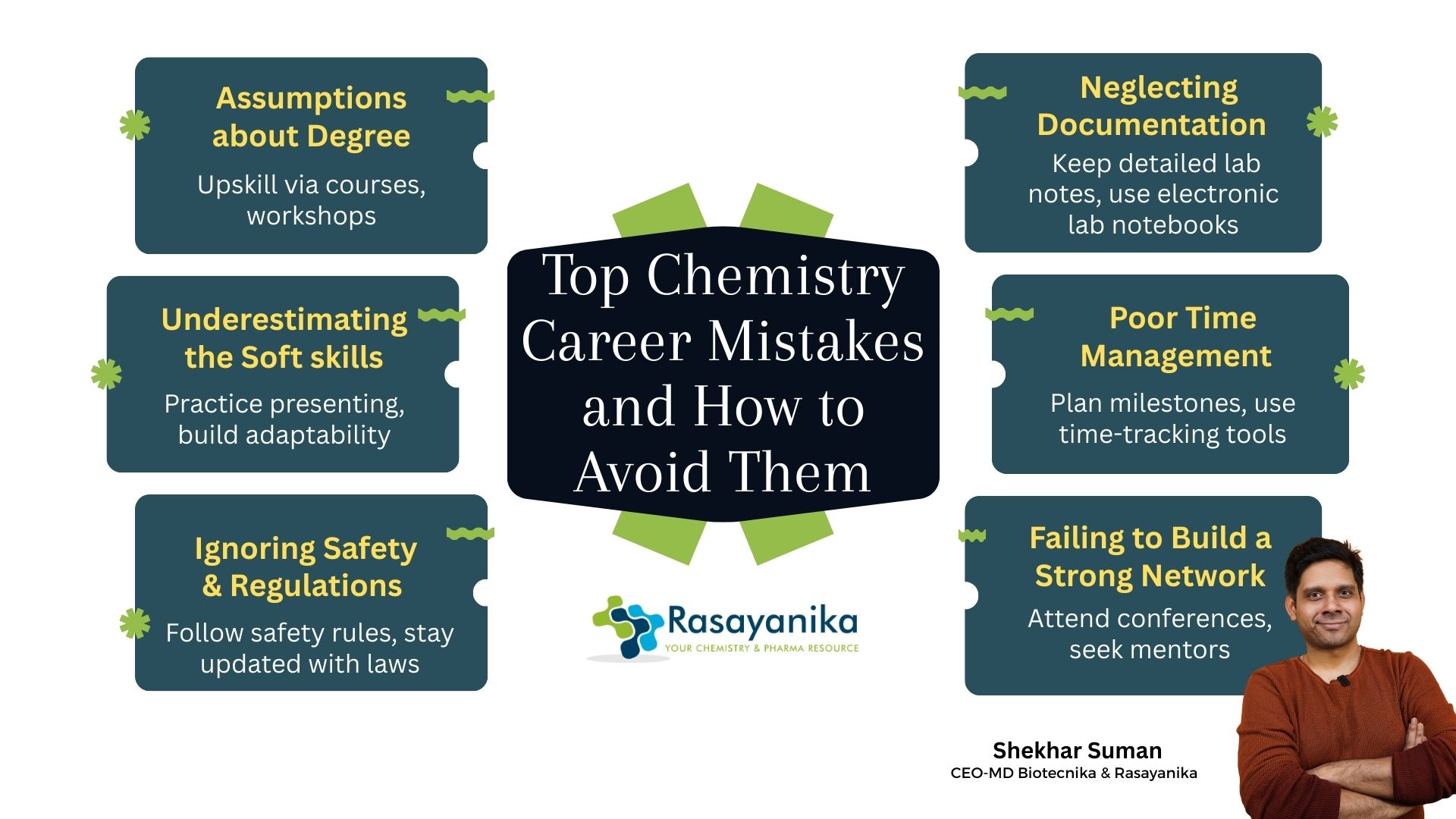Table of Contents
Top Chemistry Career Mistakes: How to Avoid Them and Soft Skills to Adapt
A career in chemistry undoubtedly opens doors to exciting opportunities. As the famous saying goes, every coin has two sides, and with advantages come disadvantages as well. Chemistry graduates have the benefits of working in reputed pharmaceutical companies and also have the opportunities to research and innovate in sustainability. Yet, just like in any field, even the brightest chemists can stumble. Many professionals unknowingly fall into patterns that hold them back, and these chemistry career mistakes can have an impactful consequence on their career path.
However, let me share some good news: most of these pitfalls are avoidable if you know what to look out for. This article provides insights into the chemistry career mistakes one should avoid and soft skills to adapt. Let us now understand and delve into the most common chemistry career mistakes, and also explore a few practical ways to sidestep them.
1. Assumptions about Degree
Earning a bachelor’s, master’s, or Ph.D. is a proud achievement. But treating your degree as the “finish line” is one of the most common chemistry career mistakes. Science has an innovation every day. There are multiple new techniques, tools, and emerging ones every year, so updating with the latest trends is the only key.
Tips to Avoid:
- It is always good to be updated with the latest research. One can subscribe to authentic journals and scientific magazines to stay updated.
- Candidates who are willing to thrive in the industry should also consider taking short courses or certifications. There are numerous courses available for those trending areas, such as green chemistry, computational methods, or regulatory science.
- Join professional development workshops offered by societies like the Royal Society of Chemistry or the American Chemical Society.
Learning never ends, and keeping us updated with the recent research will always make the candidates invaluable. This not only helps in thriving in this ever-evolving job market but also ensures that candidates are an asset to the company.
2. Underestimating the Soft skills
Most candidates have a thorough understanding of technical aspects, but may not possess strong communication skills. This could have a negative impact on the career ladder. One must possess sufficient knowledge of both soft skills and technical aspects. Poor communication or a lack of teamwork can limit your growth. Many candidates overlook soft skills and only realize their importance too late. Be smart and try to adapt soft skills.
Tips to Avoid:
- Practice simplifying complex findings for non-technical audiences.
- Building teamwork will reduce the burden and help improve skills during collaborations.
- Develop adaptability, as projects often shift direction quickly in the industry.
One should understand that chemistry is not just about working with molecules, but also about collaborating with people to solve real-world problems.
3. Ignoring Safety and Regulatory Standards
One of the significant pitfalls could be in ignoring the safety protocols. This will not only negatively impact your career but can also jeopardize the health and safety of ordinary people. Whether you work in academia or industry, regulations and ethics are non-negotiable. This area must be given high priority to avoid any legal consequences.
How to avoid it:
- One should meticulously follow the given guidelines and lab safety protocols.
- Stay informed about local and international regulations such as REACH (EU) or FDA (US).
- Treat ethics and integrity as core professional values, not box-ticking exercises.
Compliance shows professionalism and builds trust with employers and collaborators.
4. Neglecting Documentation
If you are an enthusiast who is willing to thrive in the industry, you should have discipline and be more diligent. The candidates should avoid making sloppy notes. Missing data points could be a significant disadvantage for the research. Conducting a vague experiment will be a waste of time for you as well as the team. If candidates fail to produce credible results, it will definitely have a negative impact on their careers.
How to avoid it:
- Keep detailed lab notebooks, whether digital or paper.
- Candidates who have the habit of recording everything tend to excel in this area. Every minute detail should be recorded, including environmental conditions, reagent details, observations, and any anomalies.
- Adopt electronic lab notebooks (ELNs) for added efficiency and traceability.
Clear records not only protect you but also strengthen the reliability of your work.
5. Poor Time Management and Overcommitment
Committing to too many things will definitely have a negative impact on the quality of work. One cannot sail on multiple boats at the same time. A candidate juggling too many projects at once can end up delivering poor results in all of them. This type of mistake should be avoided in any field. It often leads to errors, stress, or missed opportunities.
How to avoid it:
- Break projects into smaller milestones.
- Utilize productivity tools or planners to effectively allocate your time.
- Factor in unexpected delays, experiments rarely go exactly as planned.
Candidates who possess good practical time management skills are always known to excel. This ensures both high-quality output and a healthier work-life balance.
6. Staying in Your Comfort Zone
It’s easy to stick to familiar tasks, but this limits your growth. A career in chemistry thrives on curiosity and innovation. Failing to challenge yourself is one of the silent chemistry career mistakes.
How to avoid it:
- Volunteer for interdisciplinary projects.
- Explore new roles in regulatory affairs, quality control, or science communication.
- Push yourself toward tasks that initially feel uncomfortable.
Stepping outside your comfort zone opens doors you didn’t know existed.
7. Failing to Build a Strong Network
Having a strong network is highly crucial in any field. The same applies to chemistry as well. One should not have only technical skills, but rather should know how to socialize and work collaboratively. Not having a solid network connection will be considered as one of the pitfalls in the industry.
Tips to Avoid:
- Attend conferences and present posters or talks.
- Join professional networks and online communities.
- Seek mentors and peer groups who can guide your progress.
A solid network can help you discover new career paths, collaborations, and even job offers.
8. Misinterpreting Data or Skipping Validation
The chemistry field is mainly about interpretation and experimentation. Rushing into conclusions without proper controls or statistical checks is one of the most serious mistakes in a chemistry career.
How to avoid it:
- It is advised to always include replicates and controls. This will help reduce errors and increase the credibility of your work.
- One should always consider using statistical tools to confirm reliability.
- Getting feedback from your peers will always help you grow. This will help us understand things from a different perspective and also aid in peer review significantly before publishing or presenting findings.
It is advised to focus more on accuracy and reproducibility. These protect your credibility and ensure your work stands up to scrutiny.
Every career journey comes with challenges. But one should be smart enough to avoid these common chemistry career mistakes. This will provide a decisive advantage any day. Continue learning, sharpen both technical and soft skills, prioritize safety, document thoroughly, manage time effectively, seek growth beyond your comfort zone, network actively, and approach data with integrity.
Chemistry should not be considered as just equations and reactions. Chemistry is a fast paced and engaging profession that will reward you adaptability, curiosity, and persistence. By staying aware of these pitfalls, you will transform your career.















































